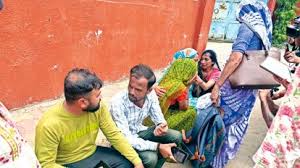One link ties all seven Portuguese nationals in Air India crash — Diu roots

When Air India Flight AI171 tragically crashed on June 12, 2025, killing all 241 people onboard, the news shook the world. But for one tiny island off the western coast of India, the sorrow ran particularly deep. Diu, a scenic coastal town known for its beaches and Portuguese forts, lost 14 of its own people that day — including seven Portuguese nationals.
To most outsiders, it seemed puzzling: why would so many Portuguese citizens be on a domestic Indian flight? The answer lies in Diu’s unique history, its colonial connection with Portugal, and a long-standing migratory trend that continues to shape the island’s identity even today.
A Colonial Past That Still Echoes
Diu was under Portuguese control for over 450 years, long after the British ruled most of India. While India gained independence from the British in 1947, Portugal held on to Diu, Daman, and Goa until 1961. It wasn’t until India’s military operation, code-named “Operation Vijay,” that these territories were integrated into the Indian Union.
However, even after integration, Portugal maintained a special policy: anyone born in its former colonies before 1961 — and their children and grandchildren — could apply for Portuguese citizenship. For many in Diu, this became a golden ticket.
The Diu–Europe Bridge
Over the years, thousands of Diu residents took advantage of Portugal’s citizenship policy. With Portuguese passports in hand, they gained access to Europe through the EU’s open-border policies. Many moved to the United Kingdom, especially cities like Leicester, London, and Birmingham, seeking better job opportunities in hospitality, retail, construction, and healthcare.
The seven Portuguese nationals who died in the Air India crash were part of this group. Though they held foreign passports, they were deeply connected to Diu — by blood, memory, and roots.
Who Were the Seven?
While authorities are yet to release full biographies of the victims, locals in Diu say the seven Portuguese passport-holders were either born on the island or had close family ties there. Some were visiting to attend weddings, others had come to meet aging parents or oversee property dealings. Most planned to return to the UK or Portugal within a few weeks.
For the families, the loss is unimaginable. For the community, it has stirred both grief and reflection — on the many who left, and those who stayed behind.
The Broader Diu Tragedy
Altogether, 14 passengers from Diu died in the Air India crash. Given that Diu’s population is roughly 50,000, the tragedy touched nearly every corner of the island. Schools, shops, and local government offices observed a day of mourning. Churches and temples held memorial services, as people gathered to comfort one another.
In an emotional address, a local priest said, “They went seeking a better life, but they never forgot Diu. They carried us in their hearts. Today, we carry their memories in ours.”
Transnational Lives, Fragile Connections
The tragedy has highlighted the transnational existence many Diu families now live — with children and grandchildren settled abroad, yet still emotionally and financially connected to their ancestral home. Some return every year to celebrate festivals like Navratri or Christmas. Others invest in local guest houses, fishing businesses, or charity work.
“They may be Portuguese or British by law, but in their hearts, they are Diu residents,” says Anita Fernandes, a schoolteacher in Diu whose cousin perished in the crash.
Such dual identities are common across India’s former colonies, but Diu’s case is especially poignant because of its size and tight-knit social fabric.
A Wake-Up Call
Beyond mourning, the incident has also stirred conversations around the fragility of diaspora life. Many residents are questioning the quality of travel infrastructure and safety oversight on domestic flights. While the cause of the Air India crash is still under investigation, early reports suggest technical failure may have played a role.
Meanwhile, officials from both India and Portugal have pledged full support to the victims’ families. The Portuguese government has confirmed that it is working with Indian authorities to ensure dignified repatriation and compensation.
Diaspora Dreams: Still Alive?
Despite the tragedy, the dream of overseas opportunity remains alive in Diu. Young people continue to pursue Portuguese documentation, English-language classes, and jobs abroad. For many families, it’s a calculated decision — a chance at better wages, healthcare, and education.
But this tragedy may give pause to some.
“It’s not about fear,” says John D’Costa, a local grocer whose niece lives in the UK. “It’s about realizing how connected we all still are. Whether we’re in Diu, Lisbon, or London — we feel each other’s joys and sorrows.”
In Memory, In Motion
Today, Diu mourns not just the loss of 14 lives, but the deeper rupture in its global family. The crash brought home a painful truth — that modern mobility comes with invisible threads of risk, grief, and love.
Yet, in many ways, the Air India tragedy also reaffirmed what Diu has always been: a place where history, identity, and migration blend into something deeply human.
For the seven Portuguese nationals who died — and for all the others lost — Diu stands still in remembrance, even as life moves on.






